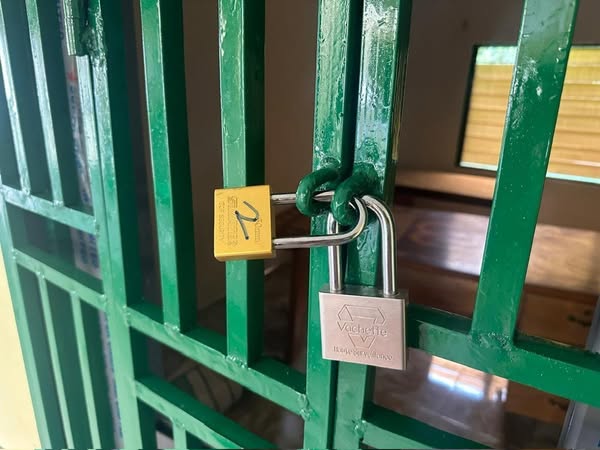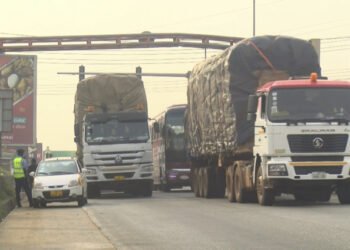Ghana’s fragile balance between state authority and civil liberties is under renewed scrutiny following growing concerns about the abuse of national security protocols.
Prominent civil society voices, including Kofi Bentil, Vice President of IMANI Africa, have raised red flags over recent incidents involving armed individuals posing as National Security operatives—a trend they warn is blurring the line between lawful enforcement and criminal activity.
At the center of the controversy is a statement by Lands Minister Emmanuel Armah-Kofi Buah condemning the actions of individuals claiming to be National Security personnel.
The Minister’s remarks follow reports of these masked and unidentified operatives storming homes and government offices, including the Bekwai Forestry office, particularly in illegal mining zones, under the pretext of enforcing state authority.
However, critics argue that these operations are conducted in ways that violate the principles of lawful policing, proper identification, and respect for citizens’ rights.
According to Bentil, this growing trend stems from dangerous procedural flaws that have taken root in how national security operations are executed.
“When you allow masked men to storm people’s homes with arms and no identification and refuse to let them identify themselves on demand, you create the situation where every criminal can storm people’s homes or offices as National security operatives.”
Kofi Bentil
He argued that without checks, such scenarios become indistinguishable from outright criminality.

Masked operatives conducting raids without warrants or identification are becoming alarmingly commonplace, especially in regions with intense galamsey (illegal mining) activity.
The absence of transparency and lawful procedure, Bentil warned, is a breeding ground for abuse.
The long-standing principle that law enforcement personnel must identify themselves when executing their duties is being ignored, thereby opening the door to what he described as “lawless action” that is gradually undermining the rule of law.
State Complicity Fuels National Security Abuses
The problem, critics argue, is not just one of bad actors impersonating state agents but also of the state’s own complicity in allowing operational norms that defy democratic governance.
For instance, the routine of sending armed men in civilian clothes and face coverings to conduct searches or arrests without due process violates both the spirit and the letter of constitutional protections.
Accordingly, Kofi Bentil cautioned that failing to identify operatives on demand removes all safeguards citizens have against impersonation.

In such an environment, he stated, even genuine agents of the state lose legitimacy, and citizens may feel compelled to resist actions they perceive as unlawful intrusions.
This, he noted, raises the possibility of open confrontation, civil unrest, and further erosion of public trust.
“Everyone acting on behalf of the state MUST, as a matter of lawful procedure, IDENTIFY THEMSELVES ON DEMAND!! Without identification, every citizen has a right to resist any order they issue and must, as a matter of self-defense, prevent them from violating their space.”
Kofi Bentil
He noted that without such procedures in place, the principle of informed consent and lawful compliance breaks down completely.
Bentil also underscored the fact that Ghana does not have a formally designated “National Security Force” separate from its constitutionally mandated security services.
Any use of the term, therefore, must not give the impression that there exists a separate unit outside of the legal framework.
In his view, no parallel security structure is permissible under Ghanaian law, and the police or other enforcement officers must always be clearly identifiable when performing their duties.
National Security Overreach Sparks Mining Sector Concerns
In addition to Bentil’s critique, Sulemana Braimah, Executive Director of the Media Foundation for West Africa, weighed in on the matter, voicing concern over National Security’s involvement in regulating the mining sector.
He referenced disturbing reports that National Security operatives had stormed Forestry Commission offices in mining districts of the Ashanti Region—an act he sees as highly irregular and unlawful.
Braimah cited a case from March in which an opposition MP from the NDC informed a state agency that a mining dispute in his constituency had been referred to National Security.

The alleged outcome was that the MP himself was tasked by National Security to oversee the mining concession in question—a move Braimah said raises deep concerns about overreach and improper jurisdiction.
“When and how National Security became the mining regulator or mine concession dispute settler. The NDC MP indicated that National Security had, as a result of the dispute over the concession, tasked him to oversee the concession until the settlement of the supposed dispute.”
Sulemana Braimah
According to Braimah, the disputed site has since devolved into an active galamsey operation, further demonstrating the problematic consequences of National Security’s unregulated interventions.
Both Bentil and Braimah have called for immediate reform and clarity. The former urged the Minister of Lands to “set your house in order”, stating that only through transparent and lawful operations can the public’s faith in governance be restored.
The latter emphasized that National Security’s involvement in illegal mining issues undermines institutional roles and opens doors to mismanagement and corruption.
As public concern grows, the call for accountability and the rule of law becomes louder.
Civil society leaders are urging the government to establish clear protocols for the identification of security personnel, limit the use of force to authorized agents, and restrict National Security’s role to intelligence rather than enforcement.
Without such reforms, observers warn that the country risks descending into a state where authority is cloaked in anonymity and impunity thrives.
READ ALSO: New York Governor Calls For National Assault Weapons Ban



















